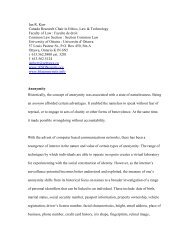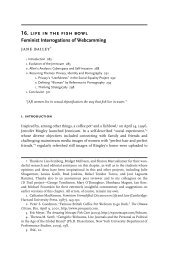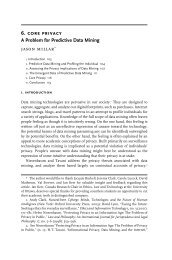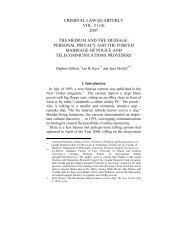Complete Cases Chart - Supreme Court of Canada - On the Identity ...
Complete Cases Chart - Supreme Court of Canada - On the Identity ...
Complete Cases Chart - Supreme Court of Canada - On the Identity ...
You also want an ePaper? Increase the reach of your titles
YUMPU automatically turns print PDFs into web optimized ePapers that Google loves.
Case Name (<strong>Court</strong>)<br />
(Judge)<br />
Location/Method <strong>of</strong> Search Relevant Statutes Issues/Holdings<br />
- (1) whe<strong>the</strong>r <strong>the</strong> search violates s. 8 <strong>of</strong> <strong>the</strong>C<strong>Chart</strong>er? - Y/N<br />
- (2) whe<strong>the</strong>r to exclude evidence by s. 24(2)? – Y/N<br />
Reasoning<br />
- (1) relevant to s.8 + CASES (Kokesch, Plant, Hunter, Tessling, Edwards)<br />
- (2) relevant to 24(2) + CASES (Collins)<br />
Prowse J.A.; Toy and<br />
Southin JJ.A. (con).<br />
* Final Level (Leave<br />
to appeal dismissed<br />
by SCC)<br />
Property - vehicle<br />
- The bag was sent by an<br />
accomplice.<br />
- Upon listening to a<br />
conversation through an<br />
apartment door, police feared<br />
<strong>the</strong> destruction <strong>of</strong> evidence<br />
and entered to arrest <strong>the</strong><br />
accused and accomplices.<br />
- Narcotic Control Act, s.<br />
10. • NO<br />
- (2) Was <strong>the</strong>re a violation <strong>of</strong> <strong>the</strong> accused’s<br />
reasonable expectation <strong>of</strong> privacy when <strong>the</strong><br />
police stood at <strong>the</strong> door <strong>of</strong> apartment and<br />
eavesdropped (ear to door)?<br />
• YES<br />
- (3) Should <strong>the</strong> evidence be excluded?<br />
• NO<br />
following day, <strong>the</strong> privacy interest which <strong>the</strong> accused asserted was a reasonable<br />
expectation <strong>of</strong> privacy in his home and not with respect to <strong>the</strong> bag and its contents.<br />
- The accused <strong>the</strong>refore did not have standing to challenge <strong>the</strong> admissibility <strong>of</strong> <strong>the</strong><br />
evidence obtained in <strong>the</strong> search and seizure <strong>of</strong> <strong>the</strong> bag at <strong>the</strong> airport.<br />
- A person inside an apartment could have no reasonable expectation <strong>of</strong> privacy with<br />
respect to conversations which could be overheard with <strong>the</strong> unaided human ear from<br />
outside <strong>the</strong> apartment.<br />
- The public has a reasonable expectation <strong>of</strong> privacy in <strong>the</strong>ir home, which includes<br />
<strong>the</strong> expectation that a person's conversations, carried on in a "normal" tone <strong>of</strong> voice,<br />
will not be eavesdropped upon by police in <strong>the</strong> manner which occurred here:<br />
someone using <strong>the</strong> hallway in a normal manner couldn’t have overheard <strong>the</strong><br />
conversation taking place in <strong>the</strong> accused's apartment.<br />
- (2) The invasion <strong>of</strong> privacy in this case was not <strong>of</strong> <strong>the</strong> magnitude <strong>of</strong> <strong>the</strong> invasion <strong>of</strong><br />
privacy accompanying searches by means <strong>of</strong> electronic devices.<br />
- Admitting <strong>the</strong> evidence would not deprive <strong>the</strong> accused <strong>of</strong> a fair trial.<br />
- Police were acting in good faith and were in hot pursuit <strong>of</strong> <strong>the</strong> accused and his<br />
accomplice.<br />
- The evidence obtained as a result <strong>of</strong> <strong>the</strong> search should not be excluded here under<br />
s. 24(2).<br />
R. v. Melenchuk<br />
[1993] B.C.J. No. 558<br />
Gibbs J.A.;<br />
Corro<strong>the</strong>rs and Prowse<br />
JJ.A. (con).<br />
*Final Level<br />
<strong>Identity</strong>/Search <strong>of</strong><br />
Person;<br />
Procedural fairness<br />
R. v. Dilling<br />
[1993] B.C.J. No. 865<br />
- The accused was charged<br />
with, and convicted <strong>of</strong>,<br />
counterfeiting U.S. money.<br />
- He challenged <strong>the</strong> search<br />
warrant based on alleged<br />
deficiencies in <strong>the</strong><br />
information used to obtain it.<br />
- The Provincial <strong>Court</strong> judge<br />
found that none <strong>of</strong> <strong>the</strong> alleged<br />
misstatements or half-truths<br />
were intended to mislead <strong>the</strong><br />
issuing Justice <strong>of</strong> <strong>the</strong> Peace.<br />
- The subject <strong>of</strong> <strong>the</strong> impugned<br />
statements was trivial.<br />
-The appellant was convicted<br />
<strong>of</strong> bargaining in a public<br />
- <strong>Chart</strong>er, ss. 8, 24, 24(2).;<br />
- Criminal Code, ss. 449,<br />
450(b).<br />
- Criminal Code, ss.<br />
213(1)(c), 495, 495(1)(b),<br />
- Did <strong>the</strong> search violate s. 8 <strong>of</strong> <strong>the</strong> <strong>Chart</strong>er?<br />
• NO<br />
- (2) Should <strong>the</strong> evidence be excluded?<br />
• NO<br />
- (1) Did taking <strong>the</strong> appellant’s photograph<br />
while he was detained violate his rights under<br />
- Ref. to Kokesch (warrant obtained in breach <strong>of</strong> <strong>Chart</strong>er not valid; police must act<br />
in good faith when conducting search).<br />
- Ref. to Hunter (s.8 protects reasonable expectation <strong>of</strong> privacy only).<br />
- (1) Where <strong>the</strong>re is no intent to mislead, <strong>the</strong> appellant must prove that <strong>the</strong><br />
misstatements or half-truths were so significant as to affect <strong>the</strong> information as a<br />
whole in terms <strong>of</strong> rendering it misleading,which he was not able to do.<br />
- (2) If <strong>the</strong>re is deliberate deception in obtaining <strong>the</strong> warrant, it would be quashed<br />
and <strong>the</strong> evidence obtained through execution <strong>of</strong> <strong>the</strong> warrant would likely be<br />
excluded, but this was not <strong>the</strong> case here so <strong>the</strong> evidence should not be excluded.<br />
- Thus, even accepting that <strong>the</strong>re were misstatements, omissions and half-truths in<br />
<strong>the</strong> information for <strong>the</strong> warrant, <strong>the</strong> evidence was at risk <strong>of</strong> exclusion under s. 24(2)<br />
only if those shortcomings were in fur<strong>the</strong>rance <strong>of</strong> a deliberate intent to mislead.<br />
- Ref. to Kokesch (boundaries <strong>of</strong> perimeter search <strong>of</strong> residence; test to determine<br />
whe<strong>the</strong>r search was unreasonable).<br />
- Ref. to Hunter (s. 8 protects reasonable expectation <strong>of</strong> privacy).<br />
- (1) The photographic record was a means <strong>of</strong> refreshing <strong>the</strong> recollection <strong>of</strong> <strong>the</strong><br />
undercover <strong>of</strong>ficer as to <strong>the</strong> identity <strong>of</strong> <strong>the</strong> person who communicated with her on<br />
40







